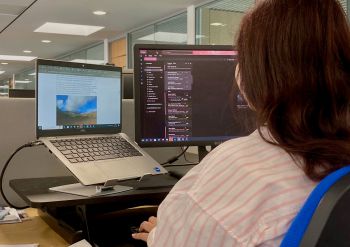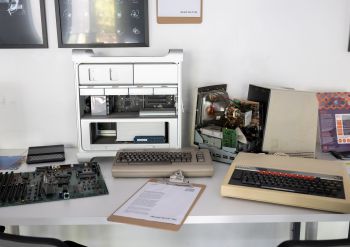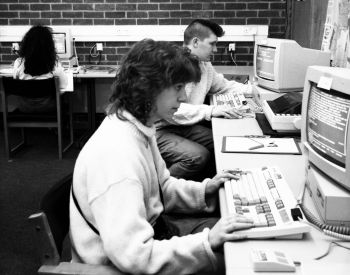Reducing waste: how we’re making the most of our IT assets
By: Ellie Evans
Last updated: Tuesday, 15 July 2025

Working on a laptop in Bramber House

Equipment at the recent Dead Tech exhibition in MAH

A photo from the archives showing much older computing equipment
Electronic waste, often referred to as e-waste, is the fastest growing waste stream worldwide – and the UK is currently the second-highest e-waste generator (per capita) in the world.
From old laptops and mobile phones to broken printers, this rubbish contains valuable materials along with hazardous substances that can harm the environment and human health if not properly managed.
That’s why we’ve been taking steps to make our laptops and desktops last for longer, as well as making sure that we refurbish or recycle devices at the end of their life to cut down on the emissions associated with production and transport as well as conserving precious resources.
Making our existing equipment last longer
The IT team have been working hard behind the scenes to extend the life of our computing assets in a number of ways, including:
-
Increasing the RAM for laptops, the physical hardware inside a computer that acts as its working memory
-
Redistributing kit returned from staff leaving under the voluntary leavers' scheme instead of buying new
-
Upgrading memory to bring equipment to a minimum spec of 16GB
-
Adding extra storage to extend the life of desktops being repurposed during lab refreshes or office moves.
What happens to our unwanted devices?
We've been working with Converge Technology Solutions, a certified Zero To Landfill business, to make the most of our IT assets that are no longer needed.
Last year, 2,349 pre-owned devices were collected for refurbishing and recycling which reduced the amount of waste to landfill or incineration by 11 tonnes.
Reusing and recycling materials in this way is equivalent to recycling more than 44,275 plastic bottles, plus it saved the same amount of water as 11 people's usage over a whole year.
The amount of energy saved? It was the equivalent of watching TV for almost 5,000 hours!
"The IT department have been working with Converge since the beginning of January 2023 to ensure the University is disposing of its waste electrical and electronic equipment in a sustainable and traceable way," explains Karen le Beau, IT Business Services Manager.
"I am really proud of the team’s commitment to working this way. IT Services are continuing to look for improvements to our processes, including attending the UCISA Sustainability Conference online where new ideas, technologies and best practice is shared."
What’s happening next
Looking ahead, ITS is currently investigating the potential future opportunity to introduce DaaS or Desktop as a Service with Apporto, a solutions provider which works with more than 200 US universities and is rapidly gaining traction in the UK with partnerships with up to 30 institutions to date.
According to Apporto, "by adopting virtual labs, institutions can reduce overhead costs, energy consumption, and e-waste, contributing to a more sustainable campus environment".
"It may be some time before we can consider adopting Apporto as a live solution, but our analysis will continue to see how we might reduce our physical infrastructure estate in the future and move to support bring-your-own-device or BYOD, which could mean less reliance on traditional fixed computer labs and more flexible spaces for students and staff to work in," adds Lee Rose, Assistant Director, Projects CTO.
To find out more about staff computers, visit Staff computers : Staff services : ... : ITS : University of Sussex
